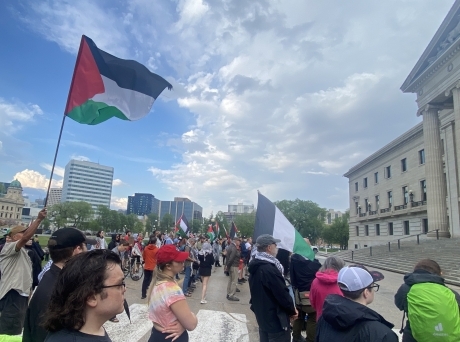Features
You are here
1919 General Strike and Nakba anniversaries tainted by overblown police budgets

May 18, 2025
Thursday May 15th marked the anniversary of the start of the 1919 Winnipeg General Strike. The strike is a proud feature of Winnipeg history, but was marred by severe police repression and violence. This grim reality is commemorated by a 2019 city monument called Bloody Saturday, completed for the centenary of the strike. The sculpture is a replica of a streetcar that was photographed on Main Street as it was overturned by defiant protesters against police and strike-breakers. It has become one of the iconic images of the strike.
The strike anniversary coincides with the anniversary of the Nakba (catastrophe) of 1948, the beginning of 77 years of dispossession, displacement, and ethnic cleansing of Palestinian people. It was marked by a commemorative rally at the Manitoba Legislature.
Despite rainy weather and smoke haze from active wildfires in eastern Manitoba, there were around 150–200 people present. The speeches from a local pastor, rabbi, and imam, as well as representatives from the Canadian Palestinian Association of Manitoba and NDP Member of Parliament Leah Gazan, were punctuated by powerful songs from Grandfather Stone led by Ricky J. drumming group.
Police get a budget boost
It is noteworthy that the day after these significant anniversaries, Deputy Chief Cam Mackid of the Winnipeg Police Service (WPS) announced a whopping $3.2 million annual investment into the expansion of an Integrated Ballistic Identification System (IBIS) for firearm crimes. The national database that stores the information from IBIS has sped up WPS investigations 120-fold and is now being extended to police services across the rest of Manitoba.
While street gangs and criminal organizations were named as the source of gun violence, Mackid neglected to mention the capitalist gangs of property developers who have influenced the social and material issues faced by downtown Winnipeg.
As Owen Toews argues in Stolen City: Racial Capitalism and the Making of Winnipeg (2018), such practices are steeped deep within Winnipeg’s history. Even earlier than when 1919 strikers were crushed in the interests of capital, the Hudson’s Bay Company traded land without the permission of the Red River Métis residents in 1869.
Root causes of crime: material and structural
Local grassroots organization Winnipeg Police Cause Harm (WPCH) says, “those who are criminalized are most commonly those who are surviving extreme poverty, mental health issues, problematic substance use, and intergenerational violence and the legacies of racism and colonization.” WPCH cite that in 2025, police account for 28.1% of the city’s operating budget, at $339.3 million. This is an increase of $18.8 million from last year, a large proportion of which goes to hiring 36 new police officers.
Such over-investment into policing is justified by the police claims that they “improve public safety and crime-solving across the province.” Yet spaces like Community Connections at Millennium Library in downtown Winnipeg are to receive no further funding in 2025.
The Manitoba Library Association stated that Community Connections was a “culturally safe, low-barrier service space to access information and resources – essential in light of growing social issues such as poverty, homelessness, and untreated addictions and mental health conditions.” Moreover, their services were “trauma-informed and guided by principles of harm reduction and positive community development.” Staff were well-versed in the needs of their patrons, and handled 45% of inquiries at the Library. This allowed the remaining staff to undertake other essential work.
The cost of running a service such as Community Connections equates to under 2% of the Winnipeg Police budget. Yet “security” has been the go-to response for problems that have come up as a result of poverty, addiction, and poorly funded services and infrastructure. For example, in January 2023, metal detectors were installed at the Millennium Library as well as more security guards, and two police officers, after someone was stabbed fatally. An earlier proposal for metal detectors at the library had been successfully knocked back by protesters, led by the community group Millennium for All.
Class struggle then and now
The two anniversaries are reminders of the wide range of struggles against oppression and exploitation that we face. As we enter the 77th year of the Nakba, Islamophobia and anti-Palestinian racism have been used repeatedly to repress activism in support of Palestinian resistance.
At 106 years since the Winnipeg General Strike, police remain the tools of capitalists and the state through coercion and violence: against workers when they resist their exploitation by striking, and against visibly poor people, Indigenous people, and other racialized people, on a daily basis.
A better use of this $3.2 million would be to fund essential services with sufficient staffing and workers who are paid a fair and living wage. Higher staff numbers can provide added safety for workers without the need for oppressive security measures and more police. Material and social support like this would serve the growing number of poor people in the city with alternatives to criminalization and provide spaces where people are treated with the degree of dignity we all deserve.
Section:









